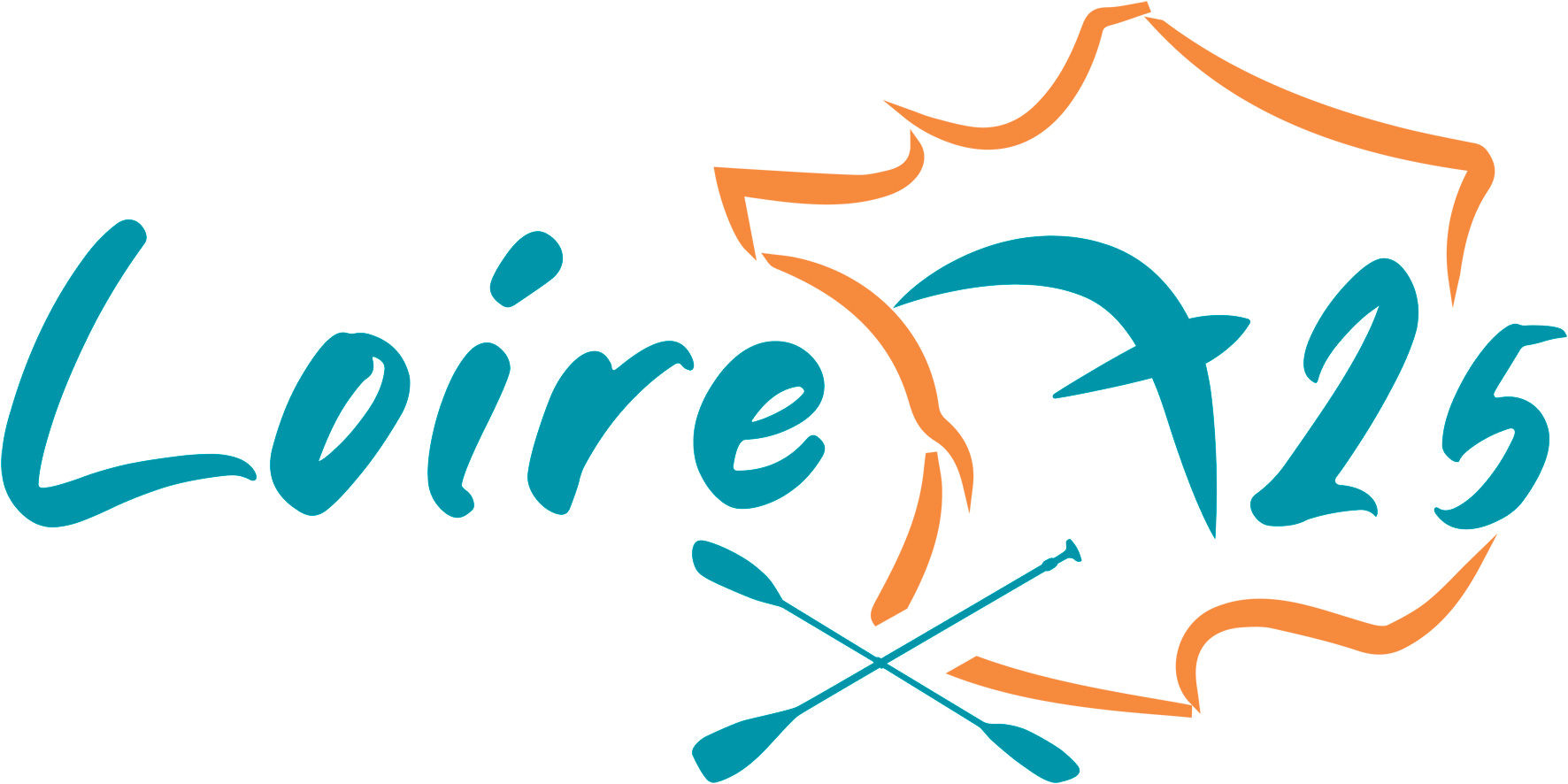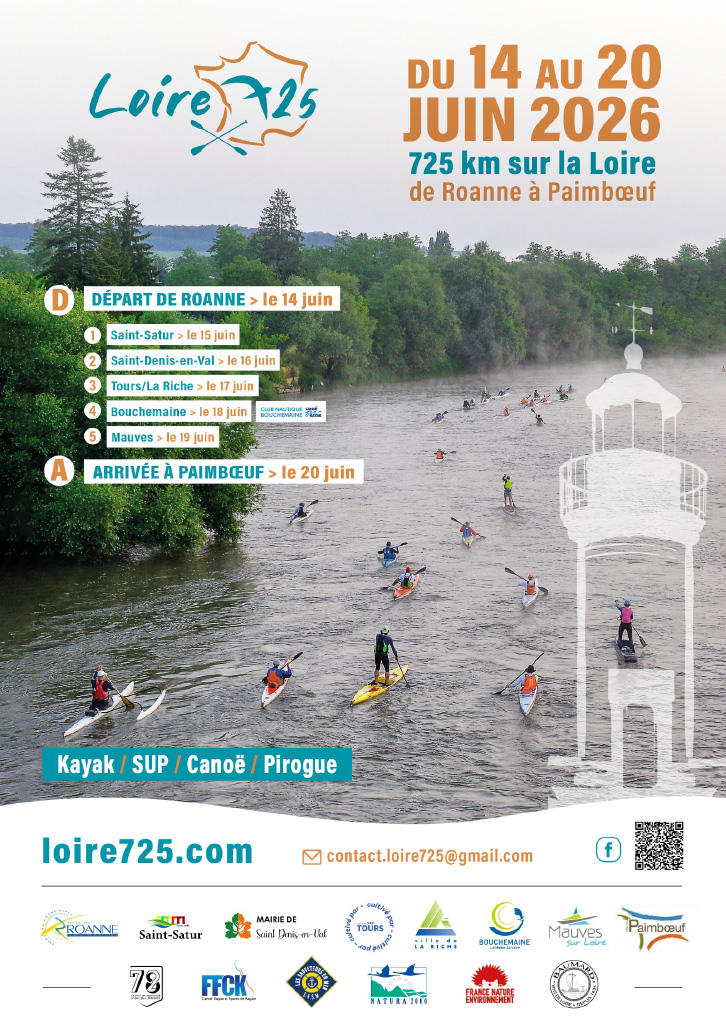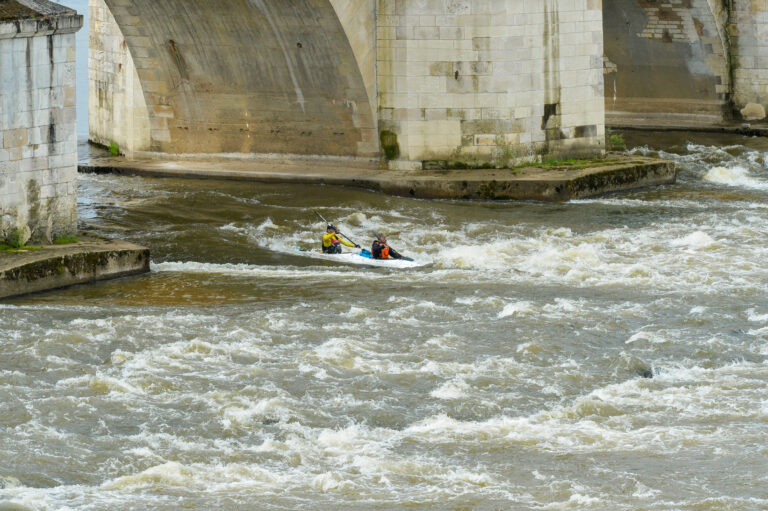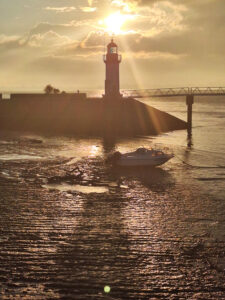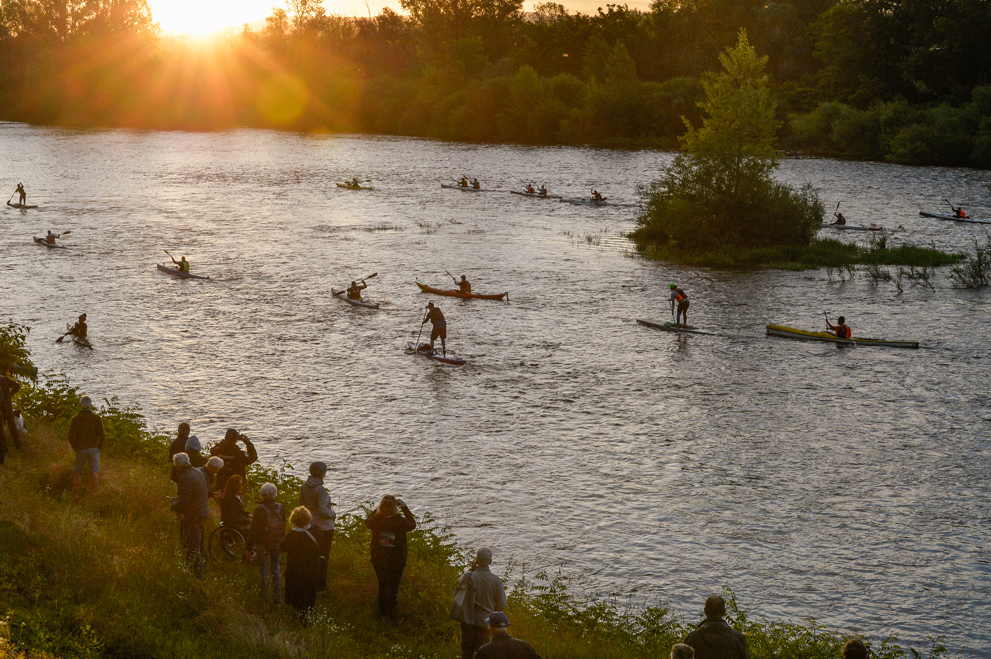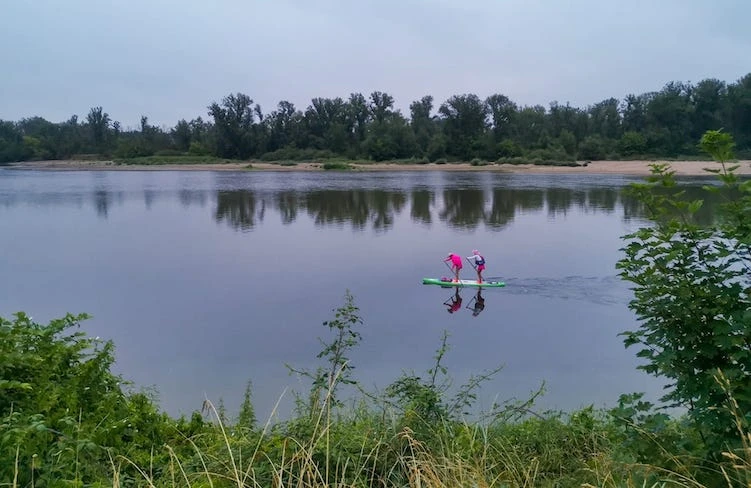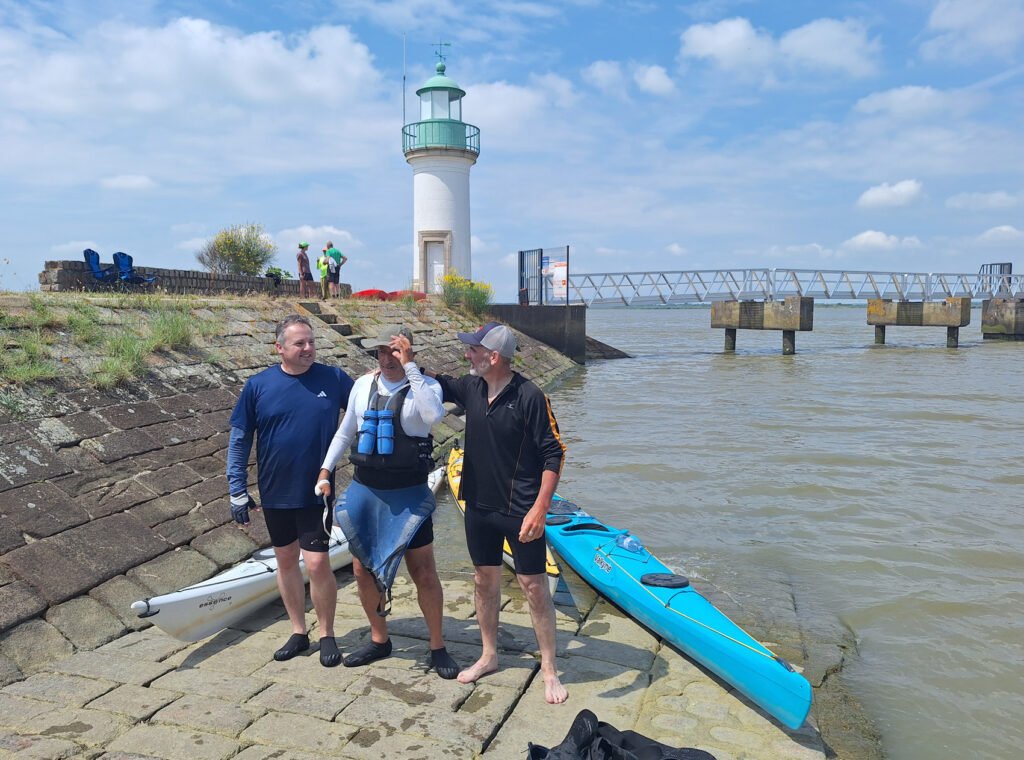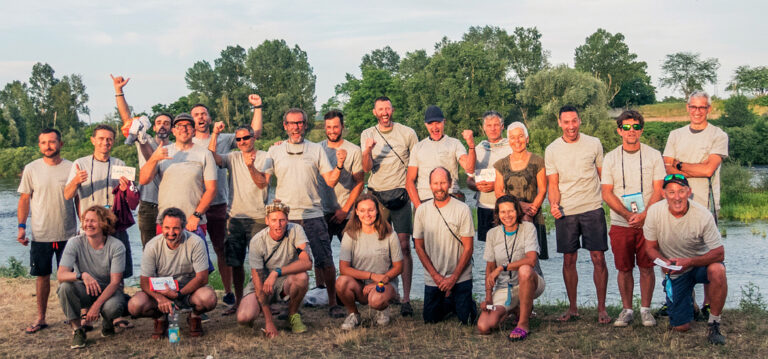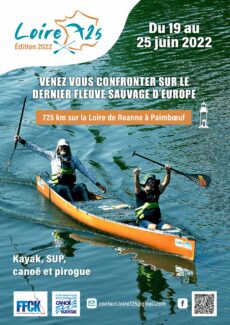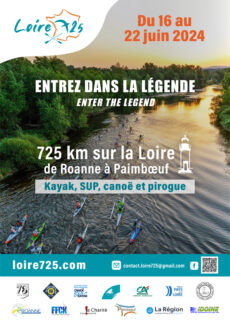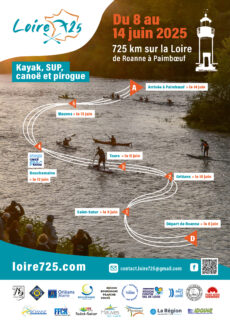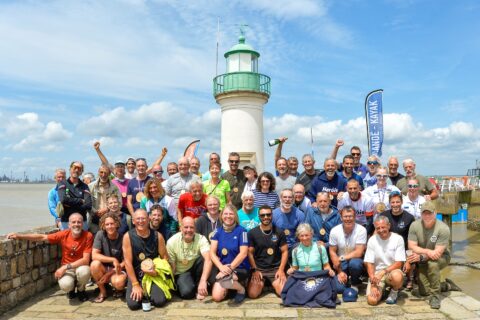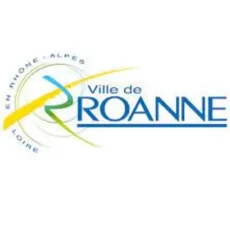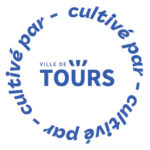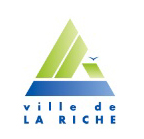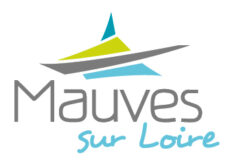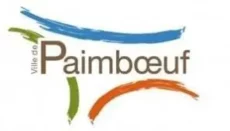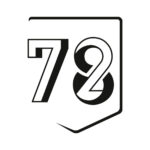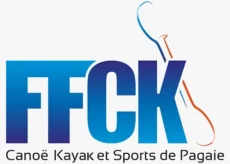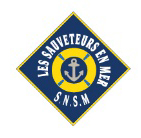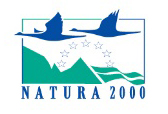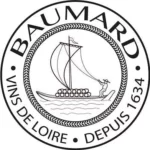Welcome to the Loire 725
725 km paddle race (kayak, stand-up paddle, canoe and pirogue)
Edition 2026
The longest canoe, kayak, stand-up paddleboard, and pirogue race in Europe. 725 km in 6 stages from Roanne to Paimboeuf
From June 14 to 20, 2026 A unique event in Europe!
Long-distance water races have been growing in Europe for the past ten years, following in the footsteps of the Dordogne Intégrale (130 or 360 km) in France, the Devizes-Westminster (201 km) in England, and the “11 City Tour” (220 km) in the Netherlands. Further afield, the Dusi in South Africa (120 km) and the famous Yukon River Quest (715 km) in Canada are now world-renowned. The Loire, the last great wild river in Europe, was bound to attract the attention of the best international paddlers!
The motivations for this sporting event are as follows:
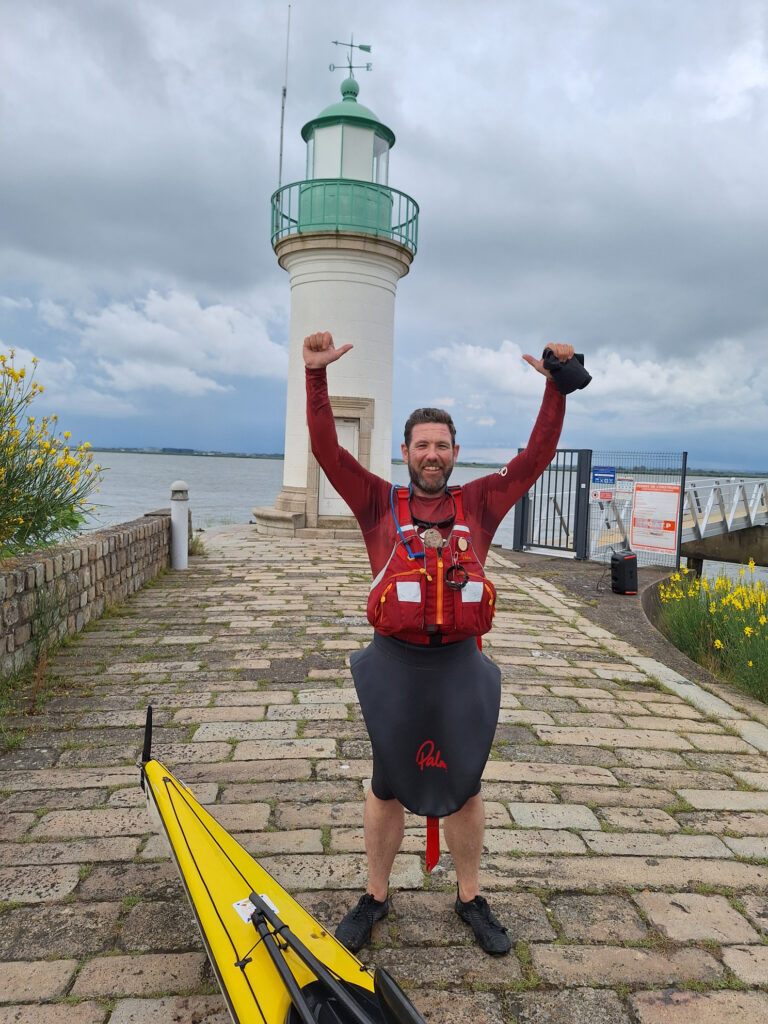
- To develop an international ultra-long-distance nautical event on Europe’s last wild river.
- To make the event a powerful training and information tool for the protection of this great wild river.
- To make this race the longest canoe-kayak and stand-up paddleboard race in Europe!
- To highlight one of the most beautiful rivers in Europe: the Loire, and all the sites it crosses, among the most renowned in the world, such as the Loire Valley châteaux.
- To benefit from the unique opportunity of 725 linear kilometers of river, with some navigational obstacles, but all passable by simple portages.
- To host an international event, linking the 10 departments and 4 regions involved in the Roanne-Paimboeuf route.
- To work in partnership with organizations committed to the protection and promotion of the Loire, from both a tourism and environmental perspective.
- Create a free space for confrontation and “meetings” between the best French and foreign competitors, whether in canoeing, kayaking, outrigger canoeing, or stand-up paddleboarding; all in an extreme nautical racing format.
- Encourage high-level competitors to take on an original challenge, and open this event to as many people as possible by accepting relay registrations.
- Communicate strongly internationally to meet demands from all continents.
- Voluntarily limit the number of boats to 150 to maintain the quality and organizational security essential for this race format.
- Make local authorities, clubs, and departmental and regional canoe-kayak committees key contacts and partners.
The Organizers
le Club Nautique de Bouchemaine, a non-profit association affiliated with the FFCK paddle sports association, is the legal entity for the race. Alain Morvan, the race’s creator, is in charge of the race. The organizing team is made up entirely of volunteers.
The Course
The course is along the Loire, between Roanne and Paimboeuf. This choice was made due to several factors:
– Start downstream from the last hydroelectric dam.
– Finish before the very maritime section of the estuary, where navigation and safety would be more difficult to ensure.
– Despite a number of navigational obstacles (bridges with insufficient water, dikes, nuclear power plants, etc.), all can be crossed after a relatively easy portage, which can be done alone or with a support team.
The route covers a total of at least 725 km and crosses four regions: Auvergne Rhône-Alpes, Bourgogne Franche-Comté, Centre Val de Loire and Pays de la Loire, and ten departments: Loire, Allier, Saône et Loire, Nièvre, Cher, Loiret, Loire et Cher, Indre et Loire, Maine et Loire, and Loire Atlantique.
Route:
The meeting point is set for Roanne at the harbor master’s office on Saturday, June 13, 2026, at 10 a.m. for the delivery of GPS trackers and at 6 p.m. for a large, shared meal after a conference on environmental issues in the Loire region and a briefing. The first leg will start from Roanne to Saint Satur on Sunday, June 14th at 6 a.m. The following legs will be Orléans, Tours/La Riche, Bouchemaine, Mauves-sur-Loire, and finally Paimboeuf.
Navigation will remain open until 10 p.m., as verified by the tracker. Boats that do not reach the finish line will, however, be ranked based on the number of kilometers covered. Only single- or double-seater boats are permitted, with or without a relay.
A large buffet will be organized in Paimboeuf.
Ranking methods:
1) Ranking without a relay: the boat crew (1 or 2 people) remains the same throughout the race. Accepted boats include kayaks, stand-up paddleboards (SUPs), canoes, or pirogues (OC or Va’a).
2) Relay classification: Boats register a maximum of twice the number of people compared to the boat’s capacity (2 for a single-seater kayak, 4 for a two-seater). Individuals may take turns freely. As long as the crew includes one more person than the boat’s capacity (e.g., 3 people for a two-seater kayak), they are classified in that category.
For both types of classification, and in the same manner, scratch classification in order of arrival for all those who reach the set goal, with classifications also by category (boat type), and by gender or mixed category.
Boats that do not reach the set goal are classified by the number of kilometers traveled and are required to report their “abandonment” and surrender their GPS tracker.
Taking into account the environmental sensitivity of the Loire:
The organizers, upholding the values of a “nature” sport and aware of the environmental quality of this great wild river, wish to take this sensitivity into account and share it with all competitors. In this sense, the organizers are committed to a process of continuous improvement and have benefited from the feedback from the four previous editions.
Great attention has been paid to identifying the natural areas crossed: Natura 2000 sites, regional nature reserves, national nature reserves, biotope protection orders, Natural Zones of Ecological, Faunistic, and Floristic Interest (ZNIEFF) to assess the impact of the event and draw up recommendations.
A map of these sensitive areas will be provided to competitors the day before the stages during briefings. Thus, the specific measures to be adopted during their crossing will serve as regulations.
The day before the start, a conference will be held by France Nature Environnement. This will allow for a better understanding and consideration of environmental issues in the Loire region. Participants are required to attend or risk disqualification.
The race regulations include these requirements.
Safety:
SNSM (National Sea Rescue Society) motorboats will be deployed on the downstream section (from Mauves-sur-Loire to Paimbœuf.
Retrospective
2021
Started as a joke, this idea for an unofficial descent without ranking ultimately brought together 22 pioneers on June 19, 2021. This allowed for a full-scale test of this adventure, unparalleled in Europe, between Roanne and Paimboeuf (725 km). And this “number zero,” after consultation with all the participants, inevitably led to the idea of a “real” race starting in June 2022: the Loire 725 was born.
2022
And 100 participants of 11 different nationalities on 80 boats, canoes, kayaks, and stand-up paddleboards, embarked on this new, extraordinary sporting adventure on June 19, 2022. The winners of the edition (François Boucher and Pieter Paauw in K2) covered the 725 km in 70 hours of navigation, an average speed of over 10 km/h. All participants reached the finish line within seven days of the race.
2024
2024 arrived, and with it its share of disappointments. Two months after registration opened, we only had 30 registrants, which jeopardized the balance of accounts, and we had to cancel this edition. Officially. But that didn’t take into account the fierce determination of some to complete the race at all costs. So, to avoid any problems, we organized an unofficial version with these 25 boats. We sailed without any special authorization, but with 25 boats over 725 km, we were far from a mass event. This allowed us to manage the competitors well with GPS trackers and, above all, with the promise of respecting the official race regulations.
2025
This is why the new 2025 edition was held in stages. 6 stages, 6 starts, 6 finishes, and therefore an effort spread over 7 days with greater conviviality and sharing. The team leaders know in advance where their team is stopping, and vice versa! At each arrival, the stopover towns generously welcome us to their municipal campsite, their canoe-kayak club, or even their fairground or rugby field. A Portuguese team, Herois Betano, with Antonio Palavra and Luis Vieira in K2, won this edition, shattering the previous record in 58 hours and 40 minutes. https://my.raceresult.com/344162/
